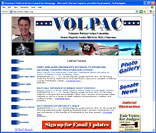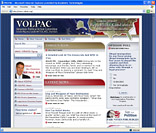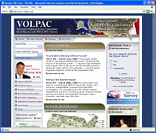


| In Brief - Did not seek re-election to the U.S. Senate in 2006. Senate Majority Leader for four years; elected on Dec. 23, 2002. Elected to the U.S. Senate in Nov. 1994, re-elected in 2000. Chairman of the NRSC in the 107th Congress. Joined the faculty at Vanderbilt University Medical Center in 1985; founded and directed the Vanderbilt Transplant Center. Surgical training at Massachusetts General Hospital; Southampton General Hospital, Southampton, England; and Stanford University Medical Center. Graduate of Princeton University, 1974 and Harvard Medical School, 1978. Born Feb. 22, 1952 in Nashville, TN. [Timeline]. |
Notes
Return to Private Life
On Nov. 29, 2006 Senate
Majority Leader Bill Frist, M.D. (R-TN) ruled
out a 2008 presidential run stating that he and his wife were "ready
to return to Nashville and private life." When Frist ran for Senate
in 1994, he limited himself to serving two terms, and he followed through
on that. He aimed to be a citizen legislator. His training
and work as a doctor informed his views on a host of issues such as the
anthrax letters, the Medicare prescription drug bill, the Schaivo case,
stem cell research, and fighting global AIDS. Indeed one of Frist's
priorities as a Senator was fighting global AIDS. He visited Africa
in 1996 and made at least half a dozen subsequent visits. However,
Frist received decidely mixed reviews of his four years as Majority Leader,
and Republicans were not able to maintain their majority in the U.S. Senate
in the 2006 mid-term elections.
Had he chosen to run for president, Frist would have been able to campaign full time free from the constraints of the majority leader's position. He did lay the groundwork for a possible run in 2005-06, chairing an active leadership PAC (VOLPAC) and making six visits each to Iowa and New Hampshire, for example. A presidential campaign would not have been easy, given the reviews of his tenure as Majority Leader. There were no signs of grassroots support as there were for some of the other prospects. Frist also is not a dynamic speaker. In fact he sometimes jokes: "As a surgeon, I was used to my patients being unconscious. Now, as a Senator, I'm used to leaving my audiences unconscious." Of course, during the anthrax attacks in 2001 Frist's calm demeanor was an asset. His expertise in health care and his competitive nature would also have stood him in good stead. Manuel Miranda, who served as nominations counsel to Frist, says of Frist, "He is not a politician driven by ambition; he is a boy scout driven by competition."
Frist's is only in his mid-50's and he may opt to return to the familly business.
Difficult Jobs
Bill Frist, M.D. has performed
more than 150 heart and lung transplant procedures. He has run at
least seven marathons. And on Dec. 23, 2002 his Republican colleagues
unanimously elected him as Senate Majority Leader, succeeding Sen. Trent
Lott (R-MS). As chairman of the National Republican Senatorial Committee
in the 2002 cycle, Frist had helped Republicans regain control of the Senate.
Now he was thrust into a job that has been compared to "herding cats."
In his first year as Senate Majority Leader Frist played a key role in getting the Medicare prescription drug bill through the Senate; it passed 54-44 on Nov. 25, 2003. Other 2003 legislative accomplishments included the third largest tax cut in history, an increase in the child tax credit, a $15 billion authorization over five years to fight global HIV/AIDS, supplementals for operations in Iraq and in Afghanistan, and the Partial Birth Abortion Ban Act. > 2004, an election year, was by most accounts not as productive legislatively, although in Dec. 2004 the Senate passed the far-reaching National Security Intelligence Reform Act of 2004.
The long-simmering matter of President Bush's judicial nominees came to the fore in the first part of 2005, presenting an important leadership challenge for Frist. As Senate Democrats persisted in blocking votes on a number of Bush's nominees, Republicans and conservative groups pushed for an up or down vote. Frist weighed whether to use what was termed the "nuclear option" or the "constitutional option" -- a change in the rules -- to end judicial filibusters. In a May 16, 2005 op ed in USA Today, Frist wrote, "It is time to vote. As Senate majority leader, I have tried for more than two years to find common ground with my Democrat colleagues." Frist continued, "Democrat colleagues have rejected all efforts at compromise, and continue to insist on a new, 60-vote standard." Debate was ongoing when, on May 23, a group of seven Republicans and seven Democrats dubbed the "gang of 14" forged a compromise. Although Frist had not been able to hold his Republican colleagues together, long-stalled nominees did get voted upon, and seven were confirmed.
The fact that Frist was seen
as a possible 2008 candidate opened him to criticism that his actions were
driven by aspirations for higher office and a need to appeal to conservative
groups. This was most evident in the first part of 2005 in the Schaivo
case, when Frist sponsored a bill to force one final legal remedy for her
parents. However, Frist went against the grain when on July 29, 2005
he called for a break with President Bush's policy on stem cell research;
specifically Frist argued the limit on
the number of stem cell
lines available for federal funding needed to be reconsidered.
All in all 2005 was a decidely
mixed year for Frist, who encountered setbacks on the nomination of John
Bolton as US ambassador to the United Nations, the Patriot Act extension,
and oil drilling in the Arctic National Wildlife Reserve. Questions
were also raised about his July 2005 sale of stock in HCA Inc. (Hospital
Corporation of America), the firm founded by his father and run by
his brother. Questions were also raised about World of Hope, Inc.,
a charitable organization which Frist formed in early 2003; this held a
big fundraiser at the Rockefeller Center on Sept. 1, 2004 and then contributed
$500,000 checks to six organizations fighting AIDS. Legislative accomplishments
included class action reform, bankruptcy reform, a gun liability bill,
CAFTA and the confirmation of Chief Justice John Roberts.
Speeches
Lincoln-Reagan Day Stump
Speech, Manchester, NH, March 4, 2005. [prepared
remarks]
Readings and Articles
Sen. Frist is working on
a memoir with Ken Abraham due out in 2007 or early 2008, publisher tbd.
See Bonna de la Cruz.
"Frist plans memoir by '08" The Tennessean. June 7,
2006.
Author of:
GOOD PEOPLE BEGET GOOD PEOPLE:
A Genealogy of the Frist Family. (Rowman & Littlefield Publishers,
Inc., Dec. 2003)
WHEN EVERY MOMENT COUNTS: What You Need to Know About Bioterrorism from the Senate's Only Doctor. (Rowman & Littlefield Publishers, Inc., March 2002).
with J. Lee Annis. TENNESSEE SENATORS, 1911-2001. (Rowman & Littlefield Publishers, Inc., Oct. 1999)
TRANSPLANT: A Heart Surgeon's Account of the Life-And-Death Dramas of the New Medicine. (1989)
See also:
Charles
Martin. July 21, 2004. HEALING AMERICA: The Life of
Senate Majority Leader Bill Frist and the Issues that Shape Our Times.
Nashville, TN: W Publishing Group.
And:
Alan K. Ota. "Running
From the Senate." CQ Weekly. June 19, 2006 (cover story).
Photos
May
25, 2006-Participating in the Alliance for Marriage's press conference
on the Marriage Protection Amendment.
April
24, 2006-At Des Moines University in Des Moines, IA. [VOLPAC]
Feb
28, 2006-Addressing the Credit Union National Association's 2006
Governmental Affairs Conference.
Feb.
10, 2006-Speaking at CPAC 2006.
Jan.
30, 2006-Speaking at a College Republicans' "Support Our Troops" rally.
Oct.
22, 2005-Keynoting the Republican Party of Iowa's 5th Annual Ronald
Reagan Dinner in Des Moines, IA. [VOLPAC]
On the Web
Official Site
www.volpac.com
 |
 |
 |
| July 7, 2005 | Nov. 16, 2005 | March 31, 2006 |
| Copyright © 2005, 2006 Eric M. Appleman/Democracy in Action |
 |